PRINCETON, NJ -- For the third consecutive year, a slim majority of Americans, 53%, say China is the leading economic power in the world today. Thirty-two percent believe the United States is, with relatively few naming other countries. In 2008-2009, Americans were more evenly divided in their views of whether China or the United States was the leading economic power. Back in 2000, Americans overwhelmingly said the United States was.
![Trend: Which one of the following do you think is the leading economic power in the world today -- [ROTATED: the United States, the European Union, Russia, China, Japan, India]?](http://content.gallup.com/origin/gallupinc/GallupSpaces/Production/Cms/POLL/9n9rfitrbe6q0ksjmv-c0q.gif)
The results are based on Gallup's annual World Affairs poll, conducted Feb. 7-10. In addition to China and the United States, 8% say Japan is the leading economic power, and 2% each say the European Union, India, or Russia.
Between Gallup's initial asking of the question in 2000 and its next update in 2008, Americans' views of the leading economic power shifted dramatically, away from the United States and toward China. That may be due partly to the health of the U.S. economy at the time of the survey, with the 2000 poll conducted during robust economic times and later updates asked during a struggling economy. The shift may also reflect an acknowledgment of China's explosive economic growth in recent years, even though the United States still ranks as the No. 1 economy in terms of gross domestic product (GDP). However, China is poised to overtake the U.S. as the largest economy in the next several years.
Generations Divide on Leading Economic Power
Most major U.S. subgroups name China as the leading economic power. However, senior citizens are one notable exception, with 52% saying the United States is the leading economic power. Americans under age 50 believe China is the No. 1 economy by roughly 3-to-1 margins.
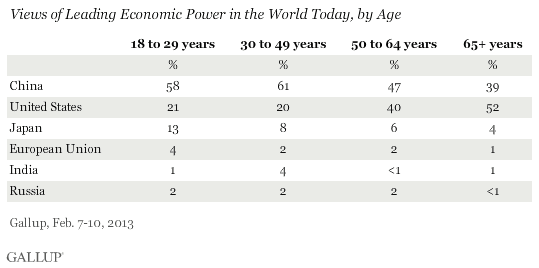
Seniors have pretty consistently said the United States is the No. 1 economic power, even as Americans' views overall have shifted. The lone exception was in 2011, when slightly more seniors said China was the leading economy.
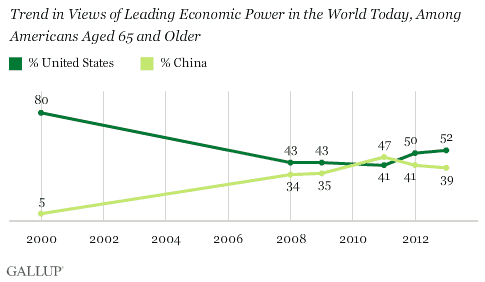
Since 2008, younger age groups have rated China as the No. 1 power, or have been evenly split between China and the United States.
Democrats Divided on Leading Economic Power
Currently, Republicans and independents say China, rather than the United States, is the leading economic power, by roughly 2-to-1 margins. Democrats are divided in their views.
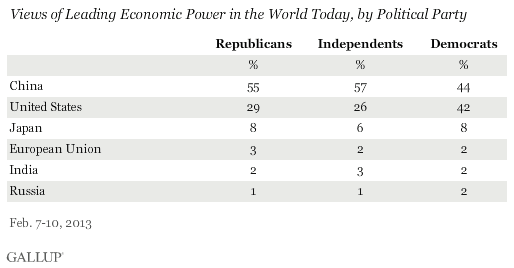
Democrats have become a bit more likely in the last two years to say the United States is the leading economic power, perhaps as a function of their increasingly positive views of the U.S. economy. This is after Democrats' belief that the U.S. was the leading economic power dipped to 26% in 2008, under Republican President George W. Bush. It took three years under a Democratic president for Democrats to move back toward seeing the U.S. as dominant.
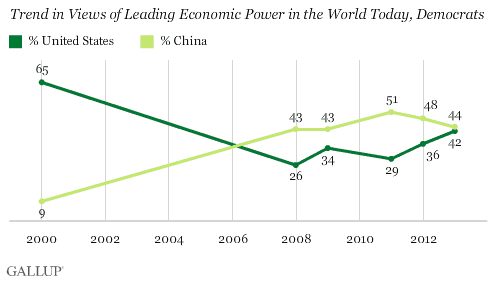
By contrast, Republicans' perceptions that the U.S. is the world's dominant economic power fell far less sharply in 2008, to 50%, when Bush was still president. However, after Barack Obama was in office two years, Republicans' views flipped, and now the majority say China is the leading power.
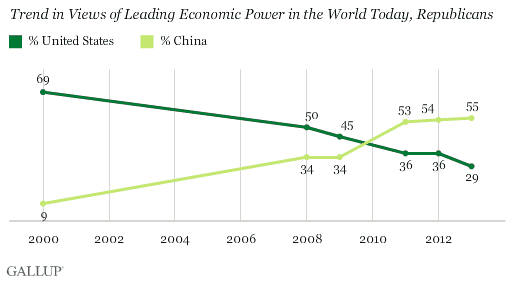
Implications
Americans' view of China as the leading economic power has been stable for the last three years. With China poised to officially become the largest world economy in the next several years, it is not clear whether that view will shift back toward the United States anytime soon.
If the U.S. economy begins to improve, Americans will feel better about the United States' economic strength in comparison to that of other countries. But that by itself may not be enough for Americans to alter their belief that China, rather than the United States, is the No. 1 economy. Indeed, at the beginning of this month, about the time the World Affairs survey was conducted, Americans' economic confidence was the best it has been in the past five years.
Additionally, older Americans seem much more inclined than younger Americans to believe the United States is the top economic power. If younger generations of Americans continue to believe that China is the nation's leading economic power, it would suggest that, barring some real-world events such as an economic collapse in China, Americans overall may see China as the top world economy well into the future.
Survey Methods
Results for this Gallup poll are based on telephone interviews conducted Feb. 7-10, 2013, with a random sample of 1,015 adults, aged 18 and older, living in all 50 U.S. states and the District of Columbia.
For results based on the total sample of national adults, one can say with 95% confidence that the margin of sampling error is ±4 percentage points.
Interviews are conducted with respondents on landline telephones and cellular phones, with interviews conducted in Spanish for respondents who are primarily Spanish-speaking. Each sample of national adults includes a minimum quota of 50% cell phone respondents and 50% landline respondents, with additional minimum quotas by region. Landline telephone numbers are chosen at random among listed telephone numbers. Cell phones numbers are selected using random digit dial methods. Landline respondents are chosen at random within each household on the basis of which member had the most recent birthday.
Samples are weighted to correct for unequal selection probability, nonresponse, and double coverage of landline and cell users in the two sampling frames. They are also weighted to match the national demographics of gender, age, race, Hispanic ethnicity, education, region, population density, and phone status (cellphone only/landline only/both, cellphone mostly, and having an unlisted landline number). Demographic weighting targets are based on the March 2012 Current Population Survey figures for the aged 18 and older U.S. population. Phone status targets are based on the July-December 2011 National Health Interview Survey. Population density targets are based on the 2010 census. All reported margins of sampling error include the computed design effects for weighting.
In addition to sampling error, question wording and practical difficulties in conducting surveys can introduce error or bias into the findings of public opinion polls.
For more details on Gallup's polling methodology, visit www.gallup.com.
